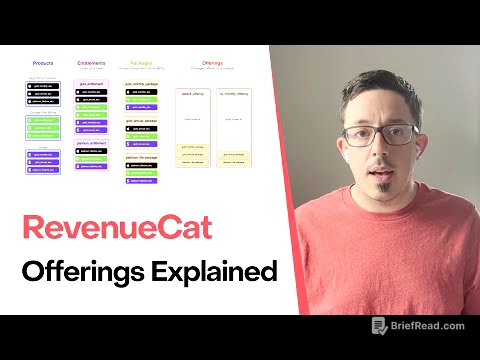TLDR;
This video features a discussion with Isaiah, a successful insurance agent, who shares his strategies for achieving high sales volumes in a short period. The conversation covers key aspects of his sales process, including time efficiency, objection handling (particularly spousal objections and concerns about affordability), and the importance of building trust through competence and confidence. Isaiah also highlights the need for adaptability in sales approaches and emphasizes the significance of perseverance, motivation, and coachability for success in the insurance industry.
- Time efficiency and energy management are crucial for maximizing sales.
- Overcoming objections, especially spousal objections and affordability concerns, is essential.
- Building trust through competence and confidence is more important than being liked.
- Adaptability to different client personalities and sales situations is key.
- Perseverance, motivation, and coachability are vital character traits for success in insurance sales.
Time Efficiency and Filtering Prospects [0:34]
Isaiah emphasizes time efficiency as crucial, focusing on maximizing each call's potential in minimal time to protect personal energy. He discerns which conversations to disengage from early on if they seem unproductive. Key to this is identifying red flags, such as a prospect's unwillingness to provide core details or reciprocate energy in discussing their needs. A telltale sign is when prospects consistently deflect, saying things like "I'm just looking around" without progressing toward solving their problem.
Handling Objections: Spousal and Financial Concerns [3:37]
Isaiah addresses common objections, noting that about 30% of closed deals involve overcoming objections, with spousal objections and lack of funds being the most frequent. For spousal objections, he emphasizes empowering the client to make the decision while allowing for a second opinion. He suggests securing coverage by starting with a smaller option, giving the client time to discuss with their spouse before the policy activates. Regarding financial concerns, he prefers addressing this early in the conversation, reassuring clients that solutions exist for those on fixed incomes, which can preemptively ease concerns.
Structuring the Sales Process for Efficiency [9:12]
Isaiah aims to move prospects to the application stage or receive a definitive "no" within 15 to 20 minutes. He allocates about five minutes for the medical section and spends the most time, around five to seven minutes, on discovery. He stresses that building rapport depends on the sales style; while some clients need more nurturing, trust and professionalism are universally crucial. Clients need to trust in your competence to solve their problems, which is more important than being liked.
Building Trust Through Competence and Confidence [12:19]
Building trust involves demonstrating confidence and competence through a fluid sales process without gaps. Quickly assisting clients with medical information and maintaining an assured tone reinforces trust. Isaiah emphasizes leading with conviction, presenting solutions decisively to assure clients of your professionalism and expertise.
Adapting to Different Client Personalities [13:57]
Isaiah adjusts his sales approach based on the client's personality, using different tones and focusing on specific pain points. He likens this adaptability to camouflage, emphasizing the importance of reading the room and tailoring the approach to connect with different individuals effectively.
Key Insights on Final Expense Clients and Sales Strategies [15:57]
Isaiah highlights that final expense sales are transactional, focusing on solving a specific need. He advises agents to take control, provide necessary options, and cut through unnecessary fluff. He also notes that spending too much time building rapport can be inefficient; professionalism and problem-solving skills are more critical.
Improving Sales Performance and Handling Difficult Clients [17:21]
For agents struggling to close deals, Isaiah suggests evaluating the intro and time management. Spending too much time on unproductive calls can hinder success. He also advises agents to be willing to let go of disrespectful or uncooperative clients, as their time is better spent on those genuinely seeking solutions.
The Importance of Skill Set and Lead Quality [19:11]
Isaiah values skill set over lead quality, asserting that a strong sales process can overcome less-than-ideal leads. While good leads are beneficial, the ability to read and react to clients is more critical for closing deals.
Selling Simplified and Graded Policies [20:17]
When selling simplified or graded policies, Isaiah advises against setting expectations for day-one coverage too early. Instead, he focuses on the value of securing some coverage when other carriers might deny or impose longer waiting periods. Framing these policies as the best available option can shift the client's perspective.
Pitching High Premiums and Presenting Value [21:43]
Isaiah recommends not being afraid to pitch higher premiums initially, especially with clients new to life insurance. He suggests presenting a range of options, with a higher-priced option making the others seem more appealing. Before revealing the price, he explains how each option solves the client's problem, emphasizing value over cost.
The Key to Success: Perseverance and Balance [25:25]
Isaiah identifies "perseverance" as the most important trait for success in the insurance industry. He emphasizes the need for a short-term memory regarding setbacks and maintaining energy to keep moving forward. Balancing work with personal life, including exercise, faith, and family time, is crucial for sustaining performance.
Advice for Struggling Agents and Essential Character Traits [27:06]
Isaiah advises struggling agents to stick with the process, fine-tune it to their strengths, and maintain self-awareness. He identifies motivation, perseverance, and coachability as essential character traits for success in life insurance sales.









